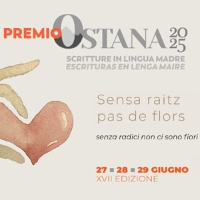“Sensa raïtz pas de flors”: verses from the secular and civil Occitan Middle Ages. Of troubadours and trobairitz, poets of a time (certainly distant) no longer overshadowed by the expectation of the end of the world or the sadness of sin carried as a burden from birth. Men and women for whom the only contests were those of love, and greatness lay in virtue. Try saying it, “sensa raïtz pas de flors”: it sounds smooth, sweet, poetic. The inspiration, the metaphor if you will, comes from Creation: without roots, and without the earth that nourishes them from below, there would be no trees, no plants. Nor could flowers spread their petals in spring. The world would be less colourful, certainly sadder and darker. Poets are poets because their verses invite us to explore the true meaning of life: the unspoken, profound, imaginative one, capable of revealing to us what we are or could be, more aware and perhaps happier. Thus, by extension, without memory, without roots, there is no life worth living. Without knowledge of our past, there is no future. Paraphrasing an African proverb, without memory, we remain forever children. This is the meaning of the motto chosen for this year’s edition of the “Premio Ostana – Writings in Mother Tongues.” From those verses of Occitan poets, the great celebration of the world’s languages draws inspiration in the presence of Monviso.
This is not a botanical parallel, or not just that. For every people, languages are the concrete (and most intimate) expression of a worldview. Languages that, over the long centuries, have accompanied the evolution of societies: their growth, new models of life, through new words and contaminations (the encounter) with other peoples, in identities that by their nature are not static but ever-changing, constantly on the move. Identities that are the rainbow of the world. And here we return to the troubadour verses, and with the spirit of our poets, troubadours and trobairitz, we imagine the extraordinary bouquet of flowers that languages are. Skilled hands have composed it by mixing shapes and colours, and now the bouquet is proudly displayed. It delights us. It suggests beauty and harmony. Yet it is up to us, conscious gardeners, to make the flowers grow, to care for them with love.
Flowers, if they find nourishment in their roots, grow everywhere: in gardens, in meadows, in the harsh mountain fields, along streams, even at the edges of roads and in deserts, in a thousand forms, colours, varieties, and sizes, they strive to live. It is up to us to find the right soil for each, to follow their growth: stem, leaves, bud, until the petals unfold and feed on the sun’s rays. In other words, to cultivate the memory of our history and our languages, to understand their evolution, to ensure that the flower does not wither from lack of nourishment and love, ending up, a mere shadow of what it was, between the pages of a book or on the shelves of an archive. This is what the annual Ostana gathering aims to be: a meeting of flowers, of gardeners of languages, to compose together that bouquet which soothes sorrows, which leads us to think that our World, in its languages, its varieties, its flowers, is a place worth living in.




commenta